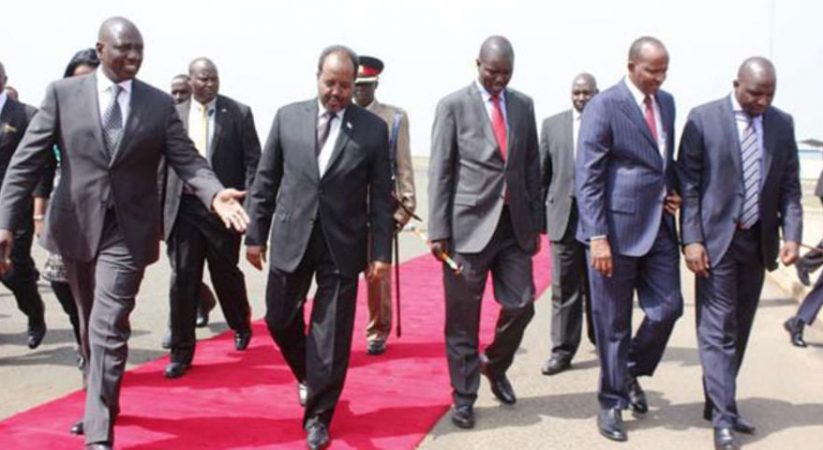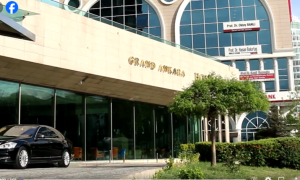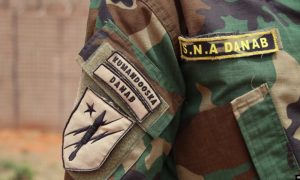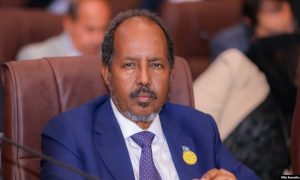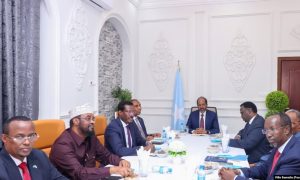
President William Ruto welcomes Somalia President Hassan Sheikh Mohamud at the Eldoret International Airport. If President Mahmud defeats the Islamic insurgency, drains the swamps of extremism and put Somalia firmly on the path to peace and development, he will be ripe for the prestigious Nobel Peace Prize — and more.
Men do not shape destiny, destiny produces the man for the hour,” said Fidel Castro.
In the Horn of Africa, the man of the hour is President Hassan Sheikh Mahmoud, 67. Somalia’s only president to pull off the rare feat of being elected twice, first in 2013-2017 and in May 2022, has a rendezvous with destiny: to defeat al-Shabaab and secure his legacy—no easy feat.
Undoubtedly, Al-Shabaab is “the largest and most deadly al-Qaeda network in the world”. Africa’s most resilient insurgency has an estimated 5,000-10,000 fighters in Somalia and a huge budget worth “tens of millions of dollars”.
Ahead of last year’s elections, the president, fondly known to his people as ‘HSM’ and nicknamed “Qoslaaye” (laughter), made defeating al-Shabaab his campaign promise and declared an “all-out war” against the group upon election. The group, in turn, declared the former teacher and businessman its “No 1 target”.
The Somali leader who was featured in the April 2013 Time magazine’s annual list of the 100 most influential people in the world during his first presidency has a strong academic bent. He blames Somalia’s woes on its unholy trinity of clan supremacism; the legacy of military rule; and alien forms of violent Islam that birthed al-Shabaab.
His all-out war against the al-Shabaab is a classic clash of ideologies.
“Political Islam need not be violent and democracy can grow in Somalia,” he recently told the London Observer.
In July 2022, he unfurled his ‘Big Tent Strategy’, which has pushed the concept and practice of ‘partnership’ in security operations to a whole new level.
This multi-pronged and whole-of-society approach to counter-insurgency from below has enabled Somalia to own its anti-terror war. The Financial Times described the offensive as “the most significant Somali-led campaign against al-Shabaab since the jihadis began”.
The counter-insurgency rests on a tripod. The first is a complex web of military partnerships. The real game-changer has been the Somali National Army’s support to clan militias and backing by the African Union’s 20,000-plus forces and air attacks from Turkish Bayraktar and US military drones. Last year, President Joe Biden redeployed 450 American troops in Somalia.
Deals with militia from some of the country’s powerful regional clans and growing discontent against extortion and forced recruitment by the jihadists amid the worst drought in decades have enabled government forces to capture a series of towns and villages and liberate swathes of territory in central Somalia. By April, the government and regional forces have taken more than 700 militants and their bases.
Stabilisation plan
Villa Somalia should now train its guns on implementing its stabilisation plans in recently liberated areas, taking essential services there, consolidating alliances and strengthening its hold on free territories.
The clash is also ideological. Systematic messaging is central to effectively neutralising al-Shabaab misinformation and propaganda, unmasking its falsified version of Islam and wresting control of the religious space and narrative from the insurgents.
As part of his attempts to deflate al-Shabaab ideology, Mahmoud appointed former al-Shabaab spokesman, Mukhtar Robow, to head the Ministry of Religious Affairs.
President Hassan has also moved to “reclaim the Islamic narrative” from the militia by uniting clerics from all sects—Muslim Brotherhood, Salafist and Sufi—behind the war.
On January 23, 2023, he opened a four-day National Conference of Somali Religious Scholars attended by more than 300 reputable Somali scholars. “Our Ulamaas remain crucial to our efforts to counter Khawaarij’s evil ideology,” he tweeted. The meeting declared support for the government’s war against al-Shabaab, denounced terror and formed a Supreme Council.
Dispensing instant justice is a cardinal pillar of Al-Shabaab’s strategy to control communities. As such, Villa Somalia has also moved to improve the judicial system. On January 21, while addressing the Annual Judicial Conference, Mahmoud stressed the significance of reforms to improve Somalia’s justice system and integrate and federalise the country’s judicial systems.
The third plank is the financial crackdown on the group that generates between an estimated $100 million and $300 million per year mainly from illicit activities and extortion.
More than 25 per cent of its revenue goes to weapons and explosives obtained through linkages with powerful criminal networks trafficking weapons from war-torn Yemen to Somalia. The government has frozen hundreds of bank and mobile money accounts, held a “couple of million dollars” and advised residents to stop paying “zakat.” These measures are crippling the group’s economic lifeline.
Promoting defection
Promoting defection is an alternative to military operations and a source of crucial information on the group’s strategy, resources and operations.
Al-Shabaab has suffered significant defections, which have hobbled its fighting and decision-making processes. Desperate, the group has resorted to recruiting children and incarceration its members suspected of trying to surrender to the government.
In-fighting between radicals and defectors has led to deaths within the group. However, funding difficulties have increased at a time when defections are increasing. The federal government should fully own and fund the programme.
As the federal government enters the second phase of the counter-insurgency, taking the war to the militants’ heartland in South West and Jubaland states, a ‘Southern Strategy’ will become necessary.
While steering clear of clan supremacy wars, the government and partners should sponsor inter-clan trust-building forums.
President Hassan’s May 2022 message of harmony and reconciliation in Somalia through peaceful resolution of differences and disputes with and between Somali clans and sub-clans should take centre stage.
A Truth and Reconciliation Commission will be necessary to ‘‘foster national healing, reconciliation, and unity, and to ensure that matters relating to impunity, revenge, and other triggers of violence are addressed through a legal and state-directed process.’’ Villa Somalia should consider bringing on board former presidents and presidential candidates into the counter-insurgency campaign to build a broader consensus.
Regionally, in the context of the ‘Southern Strategy’, the president’s big tent approach must take on a collective security paradigm. President Mahmud should leverage upon diplomatic gains made during March 31, 2023, Summit of Somalia’s neighbours — Djibouti, Ethiopia and Kenya — to strengthen partnerships in the fight against al-Shabaab.
Mogadishu should continue to enlist military support from its neighbours, including Tanzania, Uganda and Eritrea which Mahmud recently visited and which have also suffered al-Shabaab attacks.
If President Mahmud defeats the Islamic insurgency, drains the swamps of extremism and put Somalia firmly on the path to peace and development, he will be ripe for the prestigious Nobel Peace Prize — and more.
Prof Kagwanja is former Government Adviser, the Chief Executive at the Africa Policy Institute and Adjunct Scholar at the University of Nairobi and the National Defence University, Kenya.
_________________________________________________________________________
Sources: The Nation | By Peter Kagwanja
_________________________________________________________________________
Qaranimo Online
_____________________________________________________________________________________Xafiiska Wararka Qaranimo Online | Mogadishu, Somalia
_____________________________________________________________________________________Advertisement
_____________________________________________________________________________________


